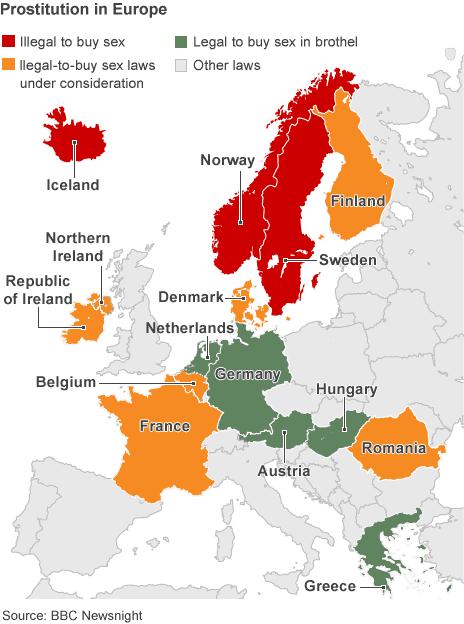Mega-brothels: Has Germany become 'bordello of Europe'?
- Published
Paradise Stuttgart was opened in 2008, six years after Germany legalised such facilities
A group of men in red and white robes stroll through the reception area. Women in high heels sit at the bar in a haze of cigarette smoke, chatting to clients and laughing.
This is Paradise, in Stuttgart, Germany - one of the largest brothels in Europe.
And it's legal.
Built at a cost of more than 6m euros (£4.9m), and opened in 2008, it boasts a restaurant, a cinema, a spa and 31 private rooms for the hundreds of male customers it attracts each day.
Germany legalised prostitution in 2002, creating an industry now thought to be worth 16bn euros a year.
By treating prostitution as a job like any other, the idea was to prise women away from the pimps that often run the sex trade.
Pension schemes
Sex workers in Germany can now pay into a pension and demand health insurance.
"You feel safe and you have security. It's not like the street where you don't know what happens with a man," said 22-year-old Hannah, who arrived in Stuttgart after two years working in a brothel in Berlin.
But critics say Germany's liberal approach with its sex laws has spectacularly failed, normalising prostitution and turning the country into what they are now calling the "bordello of Europe".
The number of prostitutes in Germany is thought to have doubled to 400,000 over the last 20 years.

Paradise Stuttgart has 31 private rooms, a cinema and a restaurant
The market is now dominated by "mega-brothels", which offer sex on an almost industrial scale, often to tourists, many of them bussed in from abroad.
Many of the women working at Paradise Stuttgart are from Eastern European countries such as Romania and Bulgaria.
The feminist Alice Schwarzer has led a campaign for Germany to reverse course on its prostitution laws and copy the approach in Sweden, where it is illegal to buy sexual services but not to sell them.
This means a man caught with a prostitute faces a heavy fine or prosecution, but the woman does not.
That model has slowly been gaining ground across Europe and is now being seriously considered in seven countries, most notably France.

A two-year UK parliamentary inquiry into the sex trade, to be published next month, is expected to recommend the same Swedish model for England and Wales, although any change in the law is extremely unlikely before the 2015 general election.
As things stand, buying and selling sex is technically legal across the whole of the UK, but a number of related activities, from running a brothel to kerb crawling and solicitation, are all criminal offences.
The problem is that tightening regulation in one part of Europe often has a knock-on effect on another.
German brothel owners near the French border are already gearing up for an increase in customers as soon as stricter laws come into force in France.
Paradise Island Entertainment, the chain that owns Stuttgart's mega-brothel and four others across central Europe, is about to open its next outlet a few hundred metres from the French border in the German city of Saarbrucken.
"The change of the law in France, which will punish the buyers of sex, is practically like winning the lottery for us because we'll get even more French customers. That's why the location is absolutely perfect," said the company's marketing chief Michael Beretin.
'Ban impossible'
"It's just not possible to ban prostitution. What's happening in France is nonsense - you can't prosecute a man for something a woman wants to do."
In Saarbrucken itself there is concern about the growth of the cross-border sex trade, with critics claiming street prostitution has increased despite the rise of regulated brothels.
The socialist mayor of the city, Charlotte Britz, supported the new prostitution laws when they were introduced in 2002, but now thinks liberalisation has gone too far.
"Prostitution has existed for many years in Germany, and we have brothels in the city centre which are more or less accepted, but it's now simply become too much," she said.
"It should not be about every country offering a different solution. Instead we should agree rules on a Europe-wide basis and then we wouldn't have sex tourism from one country to another."
The idea of a cross-border deal could be given a boost on Tuesday when the European Parliament votes on whether to officially back the stricter Swedish model.
Any decision will not be binding on individual EU states, but if the vote passes it could increase pressure on national governments to look again at the wider issue of regulating the sex trade.
You can watch Jim Reed's film in full via the BBC iPlayer.
- Published21 February 2014

- Published20 December 2013

- Published30 December 2013

- Published5 January 2014

- Published4 December 2013

- Published23 November 2013
